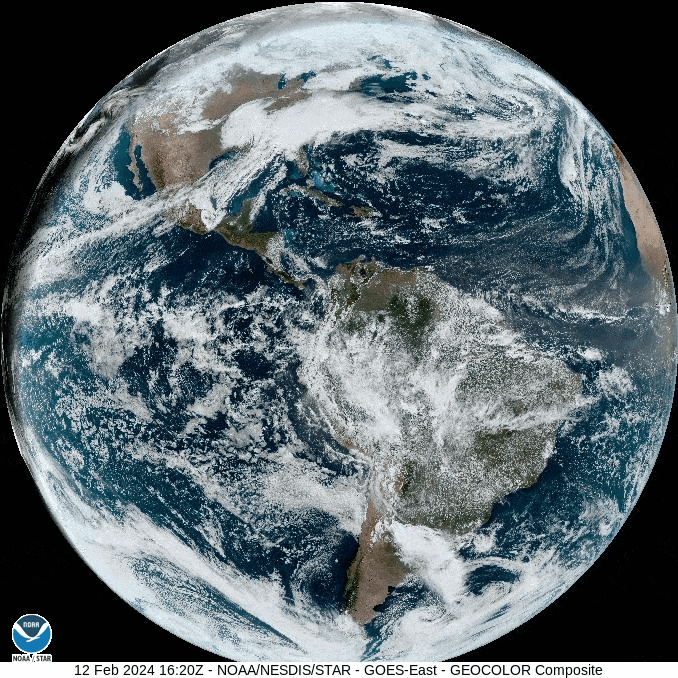Atlantic Ocean Current Weakening, Heading Toward Tipping Point, Study Finds
4 min read
Satellite image shows Atlantic Ocean currents via NOAA’s GOES-East satellite on Feb. 12, 2024. CIRA / NOAA
Founded in 2005 as an Ohio-based environmental newspaper, EcoWatch is a digital platform dedicated to publishing quality, science-based content on environmental issues, causes, and solutions.
Ocean currents are Earth’s climate regulators, distributing solar radiation and preventing regional temperatures from being more extreme.
A new study has found that the Atlantic meridional overturning circulation (AMOC) — an important climate-regulating system of ocean currents — is headed toward a tipping point, though scientists aren’t sure how soon it will occur.
“The Atlantic meridional overturning circulation (AMOC) effectively transports heat and salt through the global ocean and strongly modulates regional and global climate,” the study says. “From proxy records, it has been suggested that the AMOC is currently in its weakest state in over a millennium.”
The study by scientists from the Institute for Marine and Atmospheric Research Utrecht in the Netherlands, “Physics-based early warning signal shows that AMOC is on tipping course,” was published in the journal Science Advances.
The researchers used computer modeling and historical data to develop an early warning index for the collapse of AMOC. They were alarmed by how fast the system of ocean currents is predicted to collapse once it reaches a tipping point.
“What surprised us was the rate at which tipping occurs,” said René van Westen, lead author of the study and a postdoctoral researcher in climate physics and physical oceanography at Utrecht University, as The Guardian reported. “It will be devastating.”
The scientists found that AMOC is on a swiftly shifting course that will have extreme effects on a large swath of the planet.
AMOC, the ocean’s conveyor belt — which includes a portion of the Gulf Stream — brings warmth and nutrients like carbon from tropical waters to the Arctic, where the water cools and sinks. The pattern distributes energy, helping to temper the effects of global heating caused by humans’ burning of fossil fuels.
The rapid melting of Arctic ice sheets and Greenland glaciers is causing an enormous amount of freshwater to rush into the ocean, which gets in the way of the sinking of the warmer salt water.
The collapse of AMOC would alter global weather, making the Southern Hemisphere even hotter, expanding ice in the Arctic southward and cooling northwestern Europe by nine to 27 degrees Fahrenheit, reported The Associated Press. It would also disrupt rainfall patterns worldwide. The effects could lead to widespread water and food shortages.
“We are moving closer (to the collapse), but we’re not sure how much closer,” van Westen said, as The Associated Press reported. “We are heading towards a tipping point.”
Van Westen said AMOC’s collapse will most likely not happen for a century, but the timing is “the million-dollar question, which we unfortunately can’t answer at the moment.”
Since 1950, AMOC has weakened by 15 percent, prior research has said, as reported by The Guardian.
The new study looked for alarm bells in the Atlantic Ocean’s salinity levels between Buenos Aires and Cape Town. Using computer modeling, the researchers simulated changes to the world’s climate across two millenia. The results showed a slow decline could result in AMOC’s rapid collapse in less than a century.
“It also depends on the rate of climate change we are inducing as humanity,” van Westen said, as The Associated Press reported.
The study added that, if AMOC collapses, Atlantic sea levels would rise by more than three feet in some areas, flooding coastal cities, reported The Guardian. The Amazon’s dry and wet seasons would become inverted, possibly pushing the rainforest past a tipping point as well.
The speed of the changes would be “so abrupt and severe that they would be near impossible to adapt to in some locations,” said Tim Lenton, a climate scientist from University of Exeter who did not participate in the research, as The Associated Press reported.
Van Westen highlighted the need for humans to act to curb the climate crisis.
“We are moving towards it. That is kind of scary. We need to take climate change much more seriously,” van Westen said, as reported by The Guardian.
Subscribe to get exclusive updates in our daily newsletter!
By signing up, you agree to the Terms of Use and Privacy Policy & to receive electronic communications from EcoWatch Media Group, which may include marketing promotions, advertisements and sponsored content.





